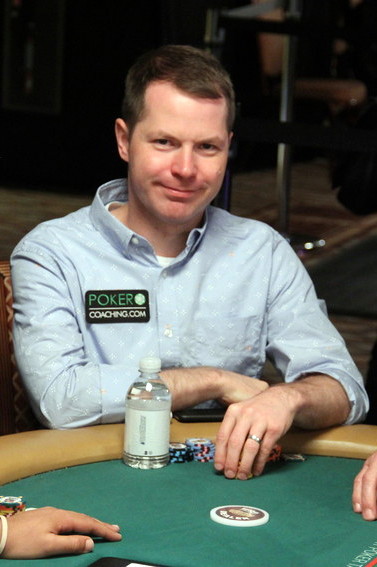






Don’t Cost Yourself Chips By Slow Playingby Jonathan Little | Published: Aug 24, 2022 |
|
|
 If you want to increase your poker skills and learn to crush the games, check out Jonathan Little’s elite training site at PokerCoaching.com/CardPlayer.
If you want to increase your poker skills and learn to crush the games, check out Jonathan Little’s elite training site at PokerCoaching.com/CardPlayer.
I recently played an interesting hand in a $2,500 buy-in World Series of Poker event that demonstrates a concept you must master if you want to succeed at poker.
Up until this hand, my day was going decently well. I had chipped up to 35,000 from my 25,000-starting stack with no significant confrontations. You will find that the biggest winners in tournament poker typically win (steal) lots of small pots that don’t belong to them, and that was exactly what I was doing up until this pot.
At 200-400 with a 400 big blind ante, everyone folded to a loose, splashy kid in the cutoff who called 400 out of his 25,000 stack. While you typically don’t see much limping in the middle- and high-stakes games, this player was limping somewhat often, likely with marginal hands he thought were not strong enough to raise.
The button folded and I decided to call 200 more from the small blind with Q 8
8 due to my amazing pot odds. While Q-8 offsuit is certainly not a strong hand, when you have to put 200 in to potentially win a 1,600 pot, you definitely cannot fold.
due to my amazing pot odds. While Q-8 offsuit is certainly not a strong hand, when you have to put 200 in to potentially win a 1,600 pot, you definitely cannot fold.
The big blind checked, and the flop came down Q J
J 3
3 .
.
If there was a preflop raise, I would check, but in a limped pot, I prefer to bet. Because if I check, it is somewhat likely that both of my opponents will check, and if one of them does bet, my hand is not strong enough to check-raise.
So, I bet 900 into the 1,600 pot. The big blind folded and the button thought for a while before raising to 3,000.
That isn’t what I wanted to see! I convinced myself that there were enough straight draws on the board combined with the fact that my opponent may have viewed my lead as weak to call with the intention of check-calling most turn bets except on an ace or king.
The turn was the Q , giving me trips.
, giving me trips.
That is exactly what I wanted to see! I checked, expecting my opponent to continue bluffing with all of his draws and perhaps only checking behind with a jack. Unfortunately, he checked behind.
Had he bet, I would have just called, opting to check-call most river bets. While I almost certainly have the best hand, if I check-raise on either the turn or river and get called, I will usually be crushed by a better made hand.
Remember that having the best hand most of the time is not a good enough reason to check-raise. It is important to ensure there are many worse made hands that can actually call your check-raise before you attempt one for value.
The river was the 6 , a complete blank. I bet 9,000 into the 7,600 pot, hoping my opponent would assume I was trying to steal the pot with a busted draw.
, a complete blank. I bet 9,000 into the 7,600 pot, hoping my opponent would assume I was trying to steal the pot with a busted draw.
My opponent instantly called and I proudly turned my hand face-up, fully expecting to win the pot, only to watch it be pushed the opposite direction when my opponent tabled Q 10
10 for trips with a better kicker.
for trips with a better kicker.
Although I lost a decent chunk of my chips with this hand, it could have been way worse. If my opponent simply bet the turn and the river, he would have won far more chips from me.
From my opponent’s point of view, when I called his flop raise, my range was almost certainly a queen, which Q-10 usually beats, a jack, which Q-10 crushes, or a draw. Most of these hands will be willing to call any reasonably sized turn bet. If I check-called the turn, my opponent could then make a sizable bet on the river to represent a range consisting of trips and busted draws, hoping to induce a call from a jack or better. By checking the turn, my opponent cost himself a huge pot.
Do not make this blunder of slow playing when your opponent almost certainly has a strong but second-best hand you crush. ♠
 Jonathan Little is a two-time WPT champion with more than $7 million in live tournament earnings, best-selling author of 15 educational poker books, and 2019 GPI Poker Personality of the Year. If you want to increase your poker skills and learn to crush the games, check out his training site at PokerCoaching.com/cardplayer.
Jonathan Little is a two-time WPT champion with more than $7 million in live tournament earnings, best-selling author of 15 educational poker books, and 2019 GPI Poker Personality of the Year. If you want to increase your poker skills and learn to crush the games, check out his training site at PokerCoaching.com/cardplayer.